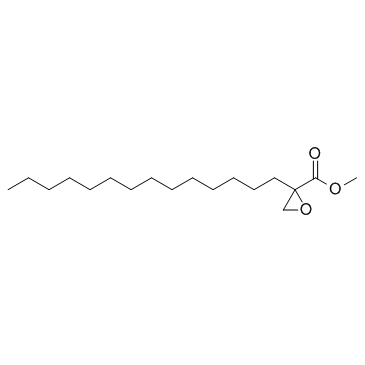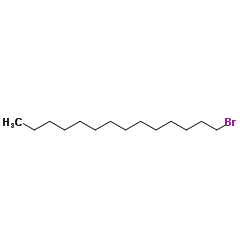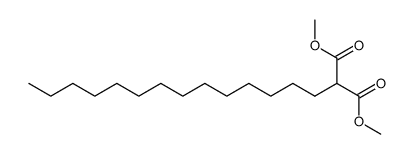2-Tetradecyl-2-oxiranecarboxylic acid methyl ester
Modify Date: 2024-01-30 20:33:14

2-Tetradecyl-2-oxiranecarboxylic acid methyl ester structure
|
Common Name | 2-Tetradecyl-2-oxiranecarboxylic acid methyl ester | ||
|---|---|---|---|---|
| CAS Number | 69207-52-9 | Molecular Weight | 298.46100 | |
| Density | 0.944g/cm3 | Boiling Point | 361.4ºC at 760 mmHg | |
| Molecular Formula | C18H34O3 | Melting Point | 44-46 ºC | |
| MSDS | N/A | Flash Point | 150.9ºC | |
Use of 2-Tetradecyl-2-oxiranecarboxylic acid methyl esterMcN3716 is a carnitine palmitoyltransferase I (CPT-1) inhibitor. |
| Name | Methyl palmoxirate |
|---|---|
| Synonym | More Synonyms |
| Description | McN3716 is a carnitine palmitoyltransferase I (CPT-1) inhibitor. |
|---|---|
| Related Catalog | |
| Target |
Carnitine palmitoyltransferase I (CPT-1)[1] |
| In Vivo | Inhibition of brain mitochondrial β-oxidation by McN3716 (Methyl palmoxirate, MEP) significantly reduces the levels of all measured HETE and epoxytrienoic acids (EET), nonenzymatic auto-oxidative metabolites of ARA, by 23% to 44% and 32% to 50% compared with vehicle-injected rats, respectively, except for 15-HETE which was unaffected. There is a significant 34% reduction in the level of 6-keto-PGF1α, a byproduct of PGI2 (prostacyclin) in McN3716-treated rats. Similarly, the brain level of hydroxyeicosapentaenoic acids, nonenzymatic auto-oxidative metabolites of EPA, is reduced by 35% to 76% upon McN3716 treatment relative to vehicle[1]. |
| Animal Admin | Rats[1] Male Sprague Dawley rats are used. The rats receive ad libitum access to standard chow and water. At 15 weeks of age, six rats were subjected to either high-energy, head-focused microwave irradiation or CO2 asphyxiation. A separate group of 11 rats were implanted with a tail vein catheter (intravenous catheter 24 gauge/0.75 inch) and received either an intravenous injection of vehicle or 10 mg/kg of McN3716. Fifteen minutes after injection, rats were rapidly euthanized by high-energy, head-focused microwave irradiation (13.5 kW for 1.6 seconds) to avert ischemia for accurate quantification of in vivo basal levels of nonenzymatic auto-oxidative PUFA metabolites and enzymatically derived metabolites. Previously, we reported that this method reduced β-oxidation of fatty acid by 23% to 74%. McN3716 (Methyl palmoxirate, MEP) readily crosses the blood–brain barrier with a plasma half-life of 0.6 minute in the rat. The brain was excised and stored at -80°C for lipidomics profiling. |
| References |
| Density | 0.944g/cm3 |
|---|---|
| Boiling Point | 361.4ºC at 760 mmHg |
| Melting Point | 44-46 ºC |
| Molecular Formula | C18H34O3 |
| Molecular Weight | 298.46100 |
| Flash Point | 150.9ºC |
| Exact Mass | 298.25100 |
| PSA | 38.83000 |
| LogP | 5.01960 |
| Index of Refraction | 1.46 |
| Storage condition | 2-8℃ |
CHEMICAL IDENTIFICATION
HEALTH HAZARD DATAACUTE TOXICITY DATA
|
| methyl 2-tetradecyloxirane-2-carboxylate |
| 2-Tetradecyloxiranecarboxylic acid methyl ester |
| methyl 2-tetradecylglycidate |
| MCN-3716 |
| Methyl parmoxirate |
| methyl 2-tetradecyloxiranecarboxylate |
| 2-Tetradecyloxirane-2-carboxylic acid methyl ester |
| ethyl palmoxirate |
| 2-Tetradecyl-2-oxiranecarboxylic acid methyl ester |
| McN3716 |




